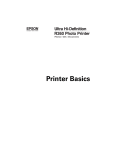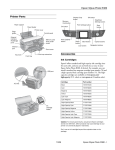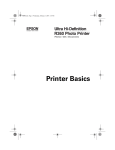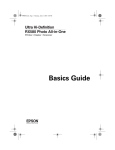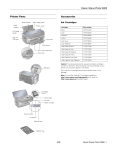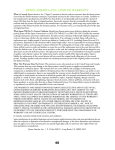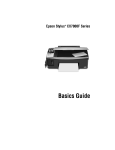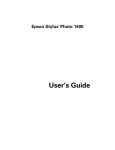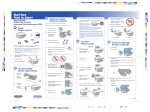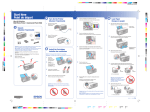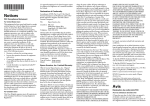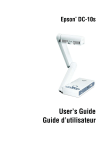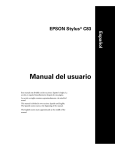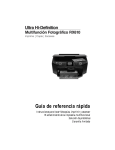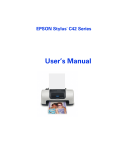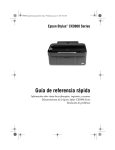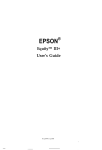Download Epson R380 Basic manual
Transcript
Printer Basics Copyright Notice All rights reserved. No part of this publication may be reproduced, stored in a retrieval system, or transmitted in any form or by any means, electronic, mechanical, photocopying, recording, or otherwise, without the prior written permission of Seiko Epson Corporation. The information contained herein is designed only for use with this Epson product. Epson is not responsible for any use of this information as applied to other equipment. Neither Seiko Epson Corporation nor its affiliates shall be liable to the purchaser of this product or third parties for damages, losses, costs, or expenses incurred by purchaser or third parties as a result of: accident, misuse, or abuse of this product or unauthorized modifications, repairs, or alterations to this product, or (excluding the U.S.) failure to strictly comply with Seiko Epson Corporation’s operating and maintenance instructions. Seiko Epson Corporation shall not be liable for any damages or problems arising from the use of any options or any consumable products other than those designated as Original Epson Products or Epson Approved Products by Seiko Epson Corporation. A Note Concerning Responsible Use of Copyrighted Materials Epson encourages each user to be responsible and respectful of the copyright laws when using any Epson product. While some countries’ laws permit limited copying or reuse of copyrighted material in certain circumstances, those circumstances may not be as broad as some people assume. Contact your legal advisor for any questions regarding copyright law. Trademarks Epson, Epson Stylus, Claria, PRINT Image Matching, the PRINT Image Matching logo, USB DIRECT-PRINT, and the USB DIRECT-PRINT logo are registered trademarks and Exceed Your Vision is a trademark of Seiko Epson Corporation. StoryTeller is a registered trademark, PhotoEnhance is a trademark, and Epson Connection is a service mark of Epson America, Inc. SD is a trademark. Memory Stick, Memory Stick Duo, Memory Stick PRO, and Memory Stick PRO Duo are trademarks of Sony Corporation. xD-Picture Card™ is a trademark of Fuji Photo Film Co., Ltd. General Notice: Other product names used herein are for identification purposes only and may be trademarks of their respective owners. Epson disclaims any and all rights in those marks. © 2006 Epson America, Inc. 11/ 2 CPD-22278R1 Contents Introduction . . . . . . . . . . . . . . . . . . . . . . . . . . . . . . . . . . . . . . . . . . . 5 Using the Printer’s Control Panel . . . . . . . . . . . . . . . . . . . . . . . . . . . . . . . 6 Loading Paper . . . . . . . . . . . . . . . . . . . . . . . . . . . . . . . . . . . . . . . . . 7 Using Special Papers . . . . . . . . . . . . . . . . . . . . . . . . . . . . . . . . . . . . . . . 10 Printing From a Memory Card . . . . . . . . . . . . . . . . . . . . . . . . . . 12 Compatible Cards and Image Formats . . . . . . . . . . . . . . . . . . . . . . . . . . . Inserting the Card . . . . . . . . . . . . . . . . . . . . . . . . . . . . . . . . . . . . . . . . . Printing From a USB Flash Drive . . . . . . . . . . . . . . . . . . . . . . . . . . . . . . Viewing Photos. . . . . . . . . . . . . . . . . . . . . . . . . . . . . . . . . . . . . . . . . . . Printing Photos. . . . . . . . . . . . . . . . . . . . . . . . . . . . . . . . . . . . . . . . . . . Touching Up Your Photos . . . . . . . . . . . . . . . . . . . . . . . . . . . . . . . . . . . Cropping Your Photos . . . . . . . . . . . . . . . . . . . . . . . . . . . . . . . . . . . . . . Restoring Default Settings . . . . . . . . . . . . . . . . . . . . . . . . . . . . . . . . . . . 13 14 15 16 16 24 26 27 Printing From a Camera or Phone . . . . . . . . . . . . . . . . . . . . . . 28 Printing From a PictBridge Camera or Phone . . . . . . . . . . . . . . . . . . . . . . 28 Printing From a Mobile Phone . . . . . . . . . . . . . . . . . . . . . . . . . . . . . . . . 30 Printing on CDs and DVDs . . . . . . . . . . . . . . . . . . . . . . . . . . . . . 31 Measuring Your CDs/DVDs . . . . . . . . . . . . . . . . . . . . . . . . . . . . . . . . . Inserting a CD or DVD . . . . . . . . . . . . . . . . . . . . . . . . . . . . . . . . . . . . . Printing Memory Card Photos on a CD or DVD . . . . . . . . . . . . . . . . . . . Returning the Output Tray to the Paper Position . . . . . . . . . . . . . . . . . . . Printing a Jewel Case Insert . . . . . . . . . . . . . . . . . . . . . . . . . . . . . . . . . . 31 32 34 36 37 Printing From Your Computer . . . . . . . . . . . . . . . . . . . . . . . . . . 38 Printing in Windows . . . . . . . . . . . . . . . . . . . . . . . . . . . . . . . . . . . . . . . 38 Printing From a Macintosh . . . . . . . . . . . . . . . . . . . . . . . . . . . . . . . . . . 41 Selecting the Correct Paper Type. . . . . . . . . . . . . . . . . . . . . . . . . . . . . . . 44 Backing Up Your Photos . . . . . . . . . . . . . . . . . . . . . . . . . . . . . . . 46 3 Maintaining Your Printer . . . . . . . . . . . . . . . . . . . . . . . . . . . . . . 48 Checking the Print Head Nozzles . . . . . . . . . . . . . . . . . . . . . . . . . . . . . . Cleaning the Print Head . . . . . . . . . . . . . . . . . . . . . . . . . . . . . . . . . . . . Aligning the Print Head . . . . . . . . . . . . . . . . . . . . . . . . . . . . . . . . . . . . . Replacing Ink Cartridges . . . . . . . . . . . . . . . . . . . . . . . . . . . . . . . . . . . . 48 49 50 51 Solving Problems . . . . . . . . . . . . . . . . . . . . . . . . . . . . . . . . . . . . . 57 LCD Screen Messages . . . . . . . . . . . . . . . . . . . . . . . . . . . . . . . . . . . . . 57 Problems and Solutions . . . . . . . . . . . . . . . . . . . . . . . . . . . . . . . . . . . . . 59 Where To Get Help . . . . . . . . . . . . . . . . . . . . . . . . . . . . . . . . . . . . . . . 62 Notices. . . . . . . . . . . . . . . . . . . . . . . . . . . . . . . . . . . . . . . . . . . . . . . 63 Index . . . . . . . . . . . . . . . . . . . . . . . . . . . . . . . . . . . . . . . . . . . . . . . . 69 4 Introduction After you have set up your Epson Stylus® Photo R380 as described on the Start Here sheet, turn here to: ■ Load paper ■ Print photos stored on a memory card ■ Print photos directly from your camera or mobile phone ■ Print on CDs or DVDs ■ Print a basic document or photo from your computer ■ Backup your photos ■ Perform routine maintenance ■ Solve simple problems This book tells you how to do most of these things without ever turning on your computer! Of course your printer can do lots more when you connect it to your Windows® or Macintosh® computer. For additional instructions, see the on-screen User’s Guide by selecting the icon for it on your desktop. Please follow these guidelines as you read your Epson Stylus Photo R380 instructions: Warning: Warnings must be followed carefully to avoid bodily injury. Caution: Cautions must be observed to avoid damage to your equipment. Note: Notes contain important information about your Epson Stylus Photo R380. Tip: Tips contain hints for better copying, scanning, and printing. Introduction 5 Using the Printer’s Control Panel View and print photos and videos on card Print on CD/DVDs Display 1 to 16 photos; crop or zoom a photo Check ink status; maintain the printer; adjust CD/DVD print position; backup photos; restore defaults; make PictBridge® or Bluetooth® settings Stop printing; cancel settings To save energy, the screen goes dark after the printer has been idle for a while. You also see the Mode lights flash back and forth. Press any button to reactivate the printer. 6 Introduction Loading Paper The type of paper you choose affects the way your printout looks, so make sure you select the correct paper for your job. If you are just printing a rough draft, plain paper is fine. However, for the best results, use one of Epson’s special ink jet papers designed for your printer. For example, photos look great printed on Epson® Ultra Premium Photo Paper Glossy. See page 10 for a list of Epson papers and ordering information. 1. Open the paper support, then pull up the extension. 2. Open the front cover and slide out the front tray extensions. Loading Paper 7 Note: Make sure the front tray is in the paper (lower) position. If it is not, push in the front tray extensions and lift up the tray lever to reposition the front tray. Then slide out the front tray extensions. 3. Slide the left edge guide to the left. 4. Insert the paper, printable side up, against the right edge behind the tab. You can load up to 120 sheets of plain paper or up to 20 sheets of photo paper. Make sure the paper stack fits under the arrow inside the left edge guide. 8 Loading Paper 5. Slide the left edge guide against the left edge of the paper (but not too tightly). 4 × 6-inch, 5 × 7-inch Letter-size, 8 × 10-inch For additional information and instructions on loading envelopes, see your on-screen User’s Guide. Loading Paper 9 Using Special Papers You can purchase genuine Epson ink and paper from an authorized Epson reseller. To find the nearest reseller, call 800-GO-EPSON (800-463-7766). Or you can also purchase online at www.epsonstore.com (U.S. sales) or www.epson.ca (Canadian sales). Paper name* Size Part number Epson Ultra Premium Photo Paper Glossy Borderless 4 × 6 inches S041934 Letter (8.5 × 11 inches) S041935 Borderless 4 × 6 inches S041808 Epson Ultra Premium Glossy Photo Paper Epson Premium Photo Paper Glossy Epson Premium Glossy Photo Paper S041727 Borderless 5 × 7 inches S041464 Borderless 8 × 10 inches S041465 Letter (8.5 × 11 inches) S041286 S041667 Epson Premium Photo Paper Semi-Gloss Epson Premium Semi-Gloss Photo Paper Epson Photo Paper Glossy Borderless 4 × 6 inches S041982 Letter (8.5 × 11 inches) S041331 Borderless 4 × 6 inches S041134 Epson Glossy Photo Paper S041671 S041809 Letter (8.5 × 11 inches) S041141 S041649 S041271 Epson Bright White Paper Letter (8.5 × 11 inches) S041586 Epson Premium Presentation Paper Matte Borderless 8 × 10 inches S041467 Letter (8.5 × 11 inches) S041257 Letter (8.5 × 11 inches) S041568 Epson Matte Paper Heavyweight Epson Premium Presentation Paper Matte Double-sided Epson Double-sided Matte Paper 10 Loading Paper Paper name* Size Part number Epson Presentation Paper Matte Letter (8.5 × 11 inches) S041062 Epson Iron-on Cool Peel Transfer paper Letter (8.5 × 11 inches) S041153 Epson Photo Quality Self Adhesive Sheets A4 (8.3 × 11.7 inches) S041106 Epson Ultra Premium Photo Paper Luster Letter (8.5 × 11 inches) S041405 Epson Photo Quality Ink Jet Paper Epson Premium Luster Photo Paper * The availability of paper types and sizes varies by location. Storing and Displaying Your Prints With proper care, photographs from your Epson Stylus Photo R380 will last for many years. The special Epson Claria™ inks designed for your printer provide the ultimate combination of photo quality and longevity when used with Epson papers for prints that are properly displayed or stored. For best results, always use Epson papers. As with traditional photos, Epson recommends proper care that will minimize color changes and lengthen display life: ■ Frame prints under glass or a protective plastic sleeve to protect them from atmospheric contaminants like humidity, smoke, and high levels of ozone. ■ As with all photographs, keep your prints away from direct sunlight. ■ Keep your prints away from high temperature. ■ For proper storage, keep your prints in a photo album or plastic photo storage box in acid-free, archival sleeves commonly available from most camera stores. ■ Always keep unused paper in the original package. Using Special Papers 11 Printing From a Memory Card The R380 lets you print color photos directly from your digital camera’s memory card; just insert it into one of the memory card slots on the printer and you’re ready to print. You can follow the same steps to print from a USB flash drive. The color and lighting in your images are automatically corrected. You can also crop your photos, manually adjust the brightness and contrast, and correct red eyes—all without using your computer! See these sections: ■ “Compatible Cards and Image Formats” on page 13 ■ “Inserting the Card” on page 14 ■ “Printing From a USB Flash Drive” on page 15 ■ “Viewing Photos” on page 16 ■ “Printing Photos” on page 16 ■ “Touching Up Your Photos” on page 24 ■ “Cropping Your Photos” on page 26 ■ “Restoring Default Settings” on page 27 For instructions on copying memory card files between your printer and a computer or other device, or on printing from a Bluetooth-enabled device, see your on-screen User’s Guide. To print directly from your digital camera, mobile phone, or PDA see page 28. 12 Printing From a Memory Card Compatible Cards and Image Formats You can use the following types of cards with your printer: Slot Type of card Top slot xD-Picture Card™ xD-Picture Card Type M xD-Picture Card Type H MagicGate™ Memory Stick MagicGate Memory Stick Duo* Memory Stick™ Memory Stick Duo™* Memory Stick PRO™ Memory Stick PRO Duo™* Top slot MultiMediaCard SD™ Card SDHC Card miniSD™ Card* miniSDHC Card* microSD Card* microSDHC Card* Bottom slot Bottom slot CompactFlash® Microdrive™ * Adapter required The printer supports image files that meet the following requirements: Media format DCF version 1.0 or 2.0 compliant* File format JPEG, DOS FAT (FAT 12 or 16, one partition) taken with a DCF version 1.0 or 2.0 compliant digital camera Supports Exif version 2.21 * Image size 80 × 80 pixels to 9200 × 9200 pixels Number of files Up to 999 DCF is the “Design rule for Camera File system” standard. Compatible Cards and Image Formats 13 Inserting the Card 1. Make sure the printer is turned on. 2. Open the memory card cover. Caution: If your card requires an adapter, make sure you insert it into the adapter before you insert it in the slot. Otherwise, the card may get stuck in the slot. Do not insert more than one card at a time, and do not force the card into the slot. 3. Make sure the memory card access light is off and that no cards are in any of the slots, then insert your card into the correct slot. See page 13 for details. The memory card access light flashes and then stays on. Memory card access light 4. Close the memory card cover. See page 16 for printing instructions. When you want to remove the card, make sure the memory card access light is not flashing, then pull the card straight out of its slot. 14 Printing From a Memory Card Caution: Do not remove the card or turn off the printer while the memory card access light is flashing; you may lose data on the card. If your printer is connected to a computer running Windows 2000 or XP, never turn off the printer or unplug the USB cable when the memory card light is flashing; you may lose data on the card. On a Macintosh, always drag the memory card icon on the desktop into the trash to eject the card before you turn off the printer or unplug the USB cable. Otherwise, you may lose data from the memory card. Printing From a USB Flash Drive When your photos are saved on a USB flash drive, you can print directly from the drive. 1. Make sure the printer is turned on, and there are no memory cards in its memory card slots. Note: If a memory card is inserted, the printer will not recognize the external USB drive. 2. Plug the flash drive directly into the EXT. I/F port on the front of the printer. 3. If you see a screen like this one, press u or d to select the folder to print from, then press OK. 4. You can view and print your photos the same way as from a memory card. See the following sections for instructions. Printing From a USB Flash Drive 15 Viewing Photos You can view each photo individually, play a slide show of your photos, or display sixteen photos at once. First, insert your memory card or USB flash drive as described above. 1. Press the Memory Card mode button. 2. Press l or r to select View and Print, then press OK. You see your first photo, with information as shown: ■ To view the photo only, without the information, press the Display/Crop button twice. ■ To view 16 photos at a time, press the Display/Crop button again. 3. If you want to view a slide show of your photos, select Slide Show. 4. Press OK to start displaying your photos one by one. ■ If you want to pause or replay the show, press u or d. ■ If you see a photo you want to print, press OK. Then, skip to step 5 on page 17. Printing Photos Before you begin, make sure the printer is in Memory Card mode and you have inserted your camera’s memory card in the appropriate card slot (see page 13). Viewing and Printing Individual Photos The View and Print Photos option lets you preview and choose individual photos to print. 1. Press l or r to choose View and Print, then press OK. 2. Press l or r to choose the photo you want to print. 3. When you see a photo you want to print, press the Copies + button. If you want more than one copy, press the Copies + button again. 16 Printing From a Memory Card 4. Repeat steps 2 and 3 for each photo you want to print. 5. Press the Print Settings button and choose your print settings (see page 21). If you loaded 4 × 6 Premium Photo Paper Glossy, skip to step 7. 6. Press OK to confirm your print settings and selections. 7. Make sure you have paper loaded, then press x Start to print your photos. Note: If you need to cancel printing, press the y Stop/Clear Settings button. Printing All the Photos on a Memory Card You can print all the photos on your memory card at once. Before you start, make sure you press the Memory Card mode button. 1. Press l or r to choose Print All Photos, then press OK. To print a copy of all your photos on 4 × 6 Premium Photo Paper Glossy, skip to step 4. 2. If you want more than one copy of all your photos, press the Copies + button. 3. Press the Print Settings button and choose your print settings (see page 21), then press OK. 4. Make sure you have paper loaded, then press the x Start button to print your photos. Note: If you need to cancel printing, press the y Stop/Clear Settings button. Printing Photos 17 Printing Photos from Specific Dates The Print by Date option lets you print all the photos on your memory card that were taken on a specific date. Before you start, make sure you press the Memory Card mode button. 1. Press l or r to choose Print by Date, then press OK to display a list of dates. 2. Press u or d to highlight a date, then press r to select it. A checkmark appears in the box for the date you selected. If you want to cancel your selection, press r again. 3. Repeat step 2 for each date you want to choose for printing, then press OK. 4. If you want more than one copy of your photos, press the Copies + button. Then press OK. 5. To view the photos taken on the dates you selected, press l or r. If you see a photo that you don’t want to print, press the Copies – button to deselect it. 6. Press the Print Settings button and choose your print settings (see page 21), then press OK. 7. Press the x Start button to print your photos. Note: If you need to cancel printing, press the y Stop/Clear Settings button. Printing Thumbnails of Your Photos You can print a proof sheet to see small “thumbnail” images of all the photos on your card. 1. Load paper as described on page 7. 2. Insert the memory card if it is not already in the slot (see page 14). 3. Press the Memory Card mode button. 18 Printing From a Memory Card 4. Press l or r to choose Print Proof Sheet, then press OK. 5. Press the Print Settings button and choose your print settings (see page 21), then press OK. 6. Press the x Start button to print the proof sheet(s). This may take a few minutes. For multiple proof sheets, the pages containing the oldest images are printed first. If you need to cancel printing more sheets, press the y Stop/Clear Settings button. View and Print Movies The Play Movie and Print Photos option lets you view and print images from MOV, AVI, and MPG videos taken with your digital camera. Note: Because the resolution of a video is lower than a photo you may not get the results you expected when printing. For the best results, choose the highest quality video setting supported by your camera. The resolution depends on your camera model and settings. See your camera’s manual for details. 1. Load paper as described on page 7. 2. Insert the memory card if it is not already in the slot (see page 14). 3. Press the Memory Card mode button. 4. Press l or r to choose Play Movie and Print Photos, then press OK. 5. Press r to choose one of the following Print Method settings, then press OK: ■ Print 1 frame: Prints an image of the scene you select. ■ Print N frames: Prints thumbnail images of a range of scenes you select (up to 12 images on one sheet of paper). 6. Press OK to begin viewing your video. 7. Press l or r to select the video you want to play, then press OK. The printer begins playing the video on the memory card. Printing Photos 19 Note: Depending on the movie resolution and the transfer rate of your memory card or storage device, the video may not play smoothly. 8. While the movie is playing, do one of the following: ■ Print 1 frame: When you see the scene you want to print, press OK. ■ Print N frames: When you see the first scene in the range you want to print, press OK to select it. When you see the last scene in the range you want to print, press OK again. Note: When viewing your videos, press l or r to rewind or fast-forward the video, press u or d to pause or restart the video, and press the Display/Crop button to display the chapter list of a video. 9. Press the Copies + button to print one copy of the image. If you want more than one copy, press the Copies + button again. 10. Press the Print Settings button and choose your print settings (see page 21), then press OK. Note: Make sure the Movie Enhance setting is turned on in the print settings. 11. Press the x Start button to print your photos. Note: If you need to cancel printing, press the y Stop/Clear Settings button. Printing Camera-Selected DPOF Photos If your camera supports DPOF (Digital Print Order Format), you can use it to preselect photos and the number of copies to print while the memory card is still in your camera. See your camera’s manual for details. 1. Load paper as described on page 7. 2. Insert the memory card containing DPOF data, as described on page 14. You see a screen like this one: 20 Printing From a Memory Card 3. Press OK to print DPOF data. You see this screen: 4. Press the Print Settings button and select settings as necessary. See page 21 for instructions. 5. Press the x Start button to print. Note: If you need to cancel printing, press the y Stop/Clear Settings button. Choosing Print Settings After choosing the photos you want to print (see page 16), make sure you choose the appropriate settings for your paper type, size, and print layout, as described below. 1. Press the Print Settings button. 2. Press r to choose Paper Type. 3. Press u or d to select the setting that matches the type of paper you loaded, then press OK. Refer to the table below: For this paper Select this Paper Type setting Epson Premium Photo Paper Glossy Epson Premium Glossy Photo Paper Prem. Glossy Epson Ultra Premium Photo Paper Glossy Epson Ultra Premium Glossy Photo Paper Ultra Glossy Epson Photo Paper Glossy Epson Glossy Photo Paper Photo Paper Plain paper Epson Bright White Paper Epson Iron-on Cool Peel Transfer Paper Plain Paper Epson Premium Presentation Paper Matte Epson Matte Paper Heavyweight Epson Premium Presentation Paper Matte Double-Sided Epson Double-Sided Matte Paper Epson Presentation Paper Matte Epson Photo Quality Ink Jet Paper Epson Photo Quality Self Adhesive Sheets Matte Printing Photos 21 4. Press d to highlight Paper Size, then press r to display a list of sizes. 5. Press u or d to choose your paper size, then press OK. 6. Press d to highlight Layout. 7. Press u or d to select one of the following layout options, then press OK. Borderless Prints one photo per sheet, borderless; rotates the photo to fit on the paper as necessary. Border Prints one photo per sheet with borders around the edges; rotates the photo to fit the paper as necessary. Upper Half Prints a photo on the top half of the sheet. Photo ID Prints photos in two different wallet sizes on one sheet of paper (available only on 4 x 6 paper) Wallet Prints nine wallet-size copies of your photo on one sheet of paper (available only on letter-size paper). 2-up Prints two photos per sheet. 4-up Prints four photos per sheet. 8-up Prints eight photos per sheet. 20-up Prints 20 photos per sheet, along with the photo number and date for each photo. Note: Some layout settings are not available for all paper types and sizes. If you don’t see the entire image in your prints, make sure you turn off the Fit to Frame setting (see page 27). 8. Press d to highlight Quality, then press r. Press u or d to select Draft, Standard, or Best, then press OK. Note that printing is slower when you use the Best Quality setting. 22 Printing From a Memory Card 9. Press u or d to highlight the settings shown in the following table, then press r to display the list of options. Press u or d to select the option you want, then press OK. Setting Description Filter Select Sepia to print your photo in a brown tone for an old-fashioned look. Select B&W to print your photo in black and white. Enhance Select PhotoEnhance to automatically adjust the brightness, contrast, and saturation of your photos. Select P.I.M. to use your camera’s PRINT Image Matching or Exif Print settings. Red Eye Reduction Select On to correct red eye. See page 24 for more information. Brightness Adjust this setting if your prints are too light or too dark. Contrast Adjust this setting to increase the contrast. Sharpness Adjust this setting to sharpen or soften your prints. Saturation Adjust the density of color. A higher saturation makes the color appear richer, while a lower saturation makes it appear paler. Date Prints the date your photo was taken in one of the following formats: yyyy.mm.dd (2006.04.13), mmm.dd.yyyy (Apr.13.2006), dd.mmm.yyyy (13.Apr.2006), or None (no date). Print Info. Select On to print your camera’s exposure time (shutter speed), F-stop (aperture), and ISO speed. Fit Frame Select On to automatically crop your photo to fit inside the space available for the layout you selected. Select Off to turn off automatic cropping and leave white space around the photo. Bidirectional Select On to increase the print speed. Select Off to improve the print quality (but your photos print more slowly). Expansion When you print borderless photos, your image is slightly expanded and cropped to fill the sheet of paper. If too much of your photo edges are cut off, select Mid or Min. Printing Photos 23 Touching Up Your Photos Your printer lets you correct the color and improve your photos without using a computer. PhotoEnhance automatically corrects under- or over-exposure, enhances skin tones, and sharpens scenery. For example, if the subject of your photo is too dark because of a bright background (backlighting), PhotoEnhance™ can adjust the lighting so that the person’s face is brighter in the printout. (This adjustment works best when faces take up a significant portion of the photo with both eyes visible.) Note: These settings apply to all selected photos and affect only your printed pictures. They do not change your original image files, and they are not reflected on the LCD screen. Automatic photo correction is on by default. However, due to the complexity and nature of some photographs, not all images can be corrected. Removing Red-Eye If eyes in your pictures appear to be red, you can fix them without using complicated software or your computer. First, select the photo or photos you want to print, then follow these steps: Note: The printer may not be able to correct all the red eyes in your photo. 1. Press the Print Settings button. 2. Press d to select Red-Eye Reduction, then press r. 3. Press d or u to select On, then press OK. 4. Press OK again, then press the x Start button to print your photo or photos. Automatically Adjusting Your Photos Any automatic image adjustments you select are applied to all your photos. By default, automatic adjustment is enabled, but you can turn it off if necessary. First, select the photo or photos you want to print, then follow these steps: 1. Press the Print Settings button. 2. Press d to select Enhance, then press r. 24 Printing From a Memory Card 3. Select from these options, then press OK: ■ PhotoEnhance: Adjusts the brightness, contrast, and saturation of your photos. For example, if you have a photo with a subject that is too dark because of a bright background (backlighting), PhotoEnhance might be able to improve the brightness levels so that the person’s face is brighter in the printout. (The PhotoEnhance face lighting adjustment works best when faces take up a significant portion of the photo with both eyes visible.) ■ P.I.M.: Uses your camera’s PRINT Image Matching® or Exif Print settings (this option is automatically selected when your pictures contain P.I.M. or Exif data). ■ None: Select this if you don’t want to use P.I.M., Exif, or PhotoEnhance. 4. Press OK again, then press the x Start button to print your photo or photos. Note: This setting remains in effect until you change it. To reset all settings to the defaults, see page 27. To make manual adjustments in addition to the automatic ones, follow the steps in the next section. Manually Adjusting Your Photos First, select the photo or photos you want to print, then follow these steps: 1. Press the Print Settings button. 2. Press d or u to choose one of these options, then press r. ■ Filter: choose Off, Sepia (for an old-fashioned brown effect), or B&W (for black and white printing) ■ Brightness: choose Standard, Brighter, Brightest, Darker, or Darkest ■ Contrast: choose Standard, Higher, or Highest ■ Sharpness: choose Standard, Sharper, Sharpest, Softer, or Softest ■ Saturation: choose Standard, Higher, Highest, Lower, or Lowest ■ Density: available only for CD/DVD printing; choose Standard, Darker, or Darkest. 3. Adjust any settings as necessary, then press OK. Touching Up Your Photos 25 Note: These settings remain in effect until you change them. To reset all settings to the defaults, see page 27. 4. Press OK again, then press the x Start button to print your photo or photos. Cropping Your Photos Your printer lets you decide how your photos fit on the page with cropping, expansion for borderless prints, and fit to frame. Cropping You can use the Display/Crop button to select only the part of the photo you want to print. This allows you to “zoom in” your printed picture without affecting your original image file. 1. After you select the photo you want to print, press the Display/Crop button. You see a yellow frame around your photo. This indicates the area that will print; the area outside the frame will be cropped out. 2. Set the area you want to print (or view) as follows: ■ Press r, l, u, or d to move the frame to a different part of the photo. ■ Press the Copies + button to zoom in and crop out more of the photo. ■ Press the Copies – button to zoom out and crop less of the photo. ■ Press the Print Settings button to rotate the box and select a vertical cropping area. To rotate the box again, press Print Settings again. 3. Press OK. You see a preview of your cropped photo. Note: Press the Back button to change the size or position of your cropped area. 4. Press OK again, and select print settings as necessary (see page 21). 5. Press the x Start button to print your photo. Note: If you need to cancel printing, press the y Stop/Clear Settings button. 26 Printing From a Memory Card Borderless Expansion When you print borderless photos, your image is slightly expanded and cropped to fill the sheet of paper. If too much of your photo edges are cut off, you can adjust the expansion setting as described below. 1. Press the Print Settings button. 2. Press u to choose Expansion, then press r. 3. If too much of your photo edges are cut off, select Mid, or Min (least expansion). If you see a white edge on your photo, select Standard. 4. Press OK to save your setting. Fit to Frame Cropped area If your photo is too long or wide to fit inside the available space on your selected layout, part of the image is automatically cropped. If you want your entire image to print with white space filling in the rest of the print area, you can turn off fit to frame. Fit to Frame turned on To turn automatic cropping off or on: 1. Press the Print Settings button. 2. Press d or u to select Fit Frame, then press r. 3. Select Off or On, then press OK. Fit to Frame turned off Restoring Default Settings Follow these steps to return all the printer settings to the factory defaults: 1. Press the Setup button. 2. Press l or r to select Restore Default Settings, then press OK. 3. Press OK again to restore settings to their factory defaults. Restoring Default Settings 27 Printing From a Camera or Phone You can print your photos directly from a digital camera, mobile phone, or other portable device. ■ If your camera or mobile phone is PictBridge- or USB DIRECT-PRINT™compatible, you can connect it directly to your printer and print your photos. ■ If your mobile phone, PDA, or other device supports infrared transmission, you can send your photos to the printer and print them wirelessly. ■ Using the optional Epson Bluetooth Photo Print Adapter, you can also print wirelessly from a Bluetooth-enabled PDA, mobile phone, or computer. For more information, see the on-screen User’s Guide. Printing From a PictBridge Camera or Phone Make sure your camera or phone supports either PictBridge or USB DIRECTPRINT, and your photos are sized between 80 × 80 pixels and 9200 × 9200 pixels. 1. Make sure the printer is turned on and has no memory cards in its slots. 2. Load the type of paper you want to use (see page 7). Load enough sheets for the number of photos you want to print. 3. Press Setup, press l or r to select PictBridge Settings, then press OK. 4. Press l or r to select your print settings, as described on page 21. 5. After you select the settings you want, press OK. Note: These settings remain in effect until you change them, so you only need to set them the first time you print from your camera or phone. To reset all settings to their defaults, see page 27. 28 Printing From a Camera or Phone 6. Connect the USB cable that came with your camera or phone to the external device USB (EXT. I/F) port on the front of your printer. Then connect the other end to the port on your camera or phone. 7. Turn on your camera or phone. One of the following messages is displayed on the LCD screen: 8. Use your camera or phone to select the photos you want to print, adjust any necessary settings, and print your photos. See your camera’s or phone’s manual for details. Note: If your camera is not compatible with PictBridge or USB Direct Print, you see a message saying the connected device cannot be used. Epson cannot guarantee the compatibility of any cameras. Depending on the printer settings and your digital camera settings, some combinations of paper type, size, and layout may not be supported. In addition, some of your digital camera settings may not be reflected in the printed output. You can print TIFF files from a memory card, but you cannot print them directly from your camera. Printing From a PictBridge Camera or Phone 29 Printing From a Mobile Phone If your mobile phone or PDA has a camera and an infrared port, you can send your photos to the printer and print them directly from your phone or PDA. 1. Make sure the printer is not printing. 2. Load the type of paper you want to use (see page 7). 3. Press Setup to enter the Setup menu. 4. Press l or r to select PictBridge Settings, then press OK. 5. Press l or r to select your print settings, as described on page 21. 6. After you select the settings you want, press OK. Note: These settings remain in effect until you change them, so you only need to set them the first time you print from your phone or PDA. To reset all settings to their defaults, see page 27. 7. Hold your phone less than 8 inches away from the infrared port on the printer. Aim your phone’s or PDA’s infrared port at the printer’s port, and send your photos. See your mobile phone manual for details. Less than 8 inches Note: You can send up to 10 photos (the maximum total image size is 3 MB), including photos that are being printed. You may not be able to transmit if direct sunlight or fluorescent light is shining onto either of the infrared ports. The printer is compliant with infrared IrDA Standard Specifications, Ver.1.3 Low Power. The maximum data rate is 4 M bits/second. 30 Printing From a Camera or Phone Printing on CDs and DVDs Your printer includes a special tray that lets you print your photos directly on ink jet-printable CDs or DVDs—without using a computer. You can also use the Epson Print CD software that came with your printer to add text and modify your designs with a variety of special effects. For instructions on using Epson Print CD on your computer, see your on-screen User’s Guide. Caution: Use only ink jet-printable CDs or DVDs for printing. Thermal-printable and standard CDs and DVDs should not be used with the printer. You can print directly on standard-size 12-cm CDs without a computer, and on both standard CDs and 8-cm mini CDs with your computer. Follow the steps in these sections to print on CDs and DVDs: ■ “Measuring Your CDs/DVDs” below ■ “Inserting a CD or DVD” on page 32 ■ “Printing Memory Card Photos on a CD or DVD” on page 34 ■ “Returning the Output Tray to the Paper Position” on page 36 ■ “Printing a Jewel Case Insert” on page 37 Measuring Your CDs/DVDs Before you print on CDs or DVDs, you need to measure the printable surface of the discs you are printing on. You can then set the inner (hub) and outer dimensions before you print. This prevents ink stains on the CD/DVD tray, which might be caused by printing on the non-coated areas of the CD or DVD. Use a millimeter ruler to measure the inner and outer dimensions as shown: See page 35 for instructions on adjusting the dimensions. Outer Inner Printing on CDs and DVDs 31 Inserting a CD or DVD Make sure the data, music, or video is burned on your ink jet-printable CDs or DVDs before you print. Otherwise, dirt or scratches on the surface may cause errors when you burn the data. If you plan to print large numbers of CDs or DVDs, it’s a good idea to print a small sample, then wait a day and check the quality to make sure it is satisfactory. Caution: Make sure you insert the tray correctly, or you may damage the printer or tray. 1. Turn on the printer and open the front cover. Only insert a CD or DVD when the printer is turned on and not printing or performing any maintenance routines. 2. Make sure the front tray extensions are pushed in, then push down the lever to raise the tray to the CD/DVD position. Caution: Do not move the tray lever when the printer is operating, and do not touch the tray when pushing down the lever. 32 Printing on CDs and DVDs 3. Place the CD or DVD on the CD tray with the white or printable side face-up. Make sure the disc lies flat on the tray. 4. Insert the CD tray carefully between the guides on the front tray. 5. Slide the CD tray in until the arrows on the trays are aligned. Don’t push in the tray too far; line up the arrows exactly. 6. Follow the instructions in the next section to print photos on your CD or DVD from your memory card. Note: If you want to add text and modify your designs with a variety of special effects, you can use the Epson Print CD software on your computer. See your on-screen User’s Guide for instructions. Inserting a CD or DVD 33 Printing Memory Card Photos on a CD or DVD 1. Insert a CD or DVD for printing, as described on page 32. 2. Press the Print CD/DVD mode button. 3. Press the Print Settings button. Press d or u to select the following: ■ Media Type: make sure CD/DVD is selected. ■ Paper Type: make sure CD/DVD is selected. ■ Paper Size: make sure CD/DVD is selected. ■ Layout: choose from the following layouts: 1-up One photo is centered on the CD/DVD. 4-up Four photos are printed on the CD/DVD, with one photo in each quarter. 8-up 8 photos are printed on the CD/DVD, arranged in a circle. 12-up 12 photos are printed on the CD/DVD, arranged in a circle. ■ If you need to adjust the printing position, select CD Inner-Outer, press r, and adjust the measurements. ■ Select other settings as necessary. For more information, see page 21. Note: All photos are printed in landscape orientation. 4. When you are finished selecting print settings, press OK. 5. Press l or r to choose a photo, then press the Copies + button. For multiple photo layouts, repeat this step for each photo you want to add. If you don’t select enough photos for the layout you have chosen, your CD will have blank spaces. 34 Printing on CDs and DVDs 6. Press x Start to print on your CD or DVD. Note: If you need to cancel printing, press the y Stop/Clear Settings button. 7. When you are finished printing, remove the CD/DVD tray from the printer. To return the output tray to the paper position, see page 36. Note: After you print, handle the CD or DVD carefully. To allow the ink to dry fully, wait at least 24 hours before playing the disc or inserting it in a drive. Keep printed discs away from moisture and direct sunlight. Adjusting the Print Position If your photo is not centered on the CD or DVD, you may need to adjust the print position. 1. Press Setup to enter the Setup menu. 2. Press l or r to select Adjust CD/DVD Print Alignment, then press OK. 3. Press r to display the position screen. 4. Press u, d, l, or r to adjust the position up to 2 mm in any direction. Then press OK. 5. Press OK again to save your changes and return to the Setup menu. Note: The printer remembers this setting even after it has been turned off, so you only need to adjust the dimensions once for a batch of CDs or DVDs. Printing Memory Card Photos on a CD or DVD 35 Returning the Output Tray to the Paper Position 1. Pull up the lever to lower the output tray to the paper position. 2. Pull out the front tray extensions. 36 Printing on CDs and DVDs Printing a Jewel Case Insert You can print a photo or an index of photos and have it automatically formatted with lines for cutting and folding to fit a CD or DVD jewel case. If you choose to print an index, up to 24 photos will be printed on the insert. If you select more than 24 photos, multiple inserts will be printed. First, make sure you load letter-size paper, remove the CD/DVD tray, and return the front tray to the paper position as described above. 1. Press the Print CD/DVD mode button. 2. Press the Print Settings button. Press d or u to select the following: ■ Media Type: select CD Jacket. ■ Paper Type: select the setting for the type of paper you loaded. ■ Layout: select CD Case Upper to print one photo, or CD Case Index to print multiple photos. 3. Select other settings as necessary, then press OK. 4. Press l and r and the Copies + button to select your photo(s). You can print up to 24 photos on one folded jewel case insert. If you select more than 24 photos, make sure you have enough sheets of paper loaded. 5. Press the x Start button to start printing. Note: If you need to cancel printing, press the y Stop/Clear Settings button. Printing a Jewel Case Insert 37 Printing From Your Computer This section describes the basic steps for printing a photo or document stored on your Windows or Macintosh computer. Note: For detailed instructions on printing, see the on-screen User’s Guide. Before you start, make sure you’ve installed your printer software and connected the printer to your computer as described on the Start Here sheet. Be sure to load the right paper and select the correct paper type setting in the printer driver. (See page 44 for more information.) Follow the instructions in these sections: ■ “Printing in Windows” (below) ■ “Printing From a Macintosh” on page 41 ■ “Selecting the Correct Paper Type” on page 44 Printing in Windows 1. Load paper (see page 7). 2. Open the photo or document in your application program. 3. Open the File menu and select Print. You see a window like this one: Select EPSON Stylus Photo R380 Series 38 Printing From Your Computer Click here to open your printer software 4. Make sure EPSON Stylus Photo R380 Series is selected, then click the Preferences or Properties button. (If you see a Setup, Printer, or Options button, click it. Then click Preferences or Properties on the next screen.) 5. On the Main tab, select the basic print settings: Select the type of document you’re printing (choose Photo or Best Photo for photos) Click here for borderless photos, after choosing paper Type Select your paper Type Select your paper Size Select your document Orientation Click here for more options Make sure you choose the correct paper Type setting for the paper you are using. See page 44 for details. Note: For more information about print settings, click the ? or Help button. Printing in Windows 39 6. For more printing options, click the Advanced button. Then select the following settings as necessary: Select a color management method (To choose No Color Adjustment, click ICM first) Select Paper & Quality Options as necessary Select Print Options as necessary Click here if you want to see this Advanced screen each time you access your print settings Note: For the highest quality on selected papers, you can select Photo RPM (5760 × 1440) from the quality option pop-up menu (as shown above). When you select Photo RPM, printing will take longer. For more information about advanced settings, or instructions on saving them as a group so you can reuse them later, click ? or Help. 7. If you want to change the layout settings, click the Page Layout tab and select settings as necessary. 40 Printing From Your Computer 8. Click OK to save your settings, then click OK or Print to start printing. This window appears and shows the progress of your print job. Click to pause or resume printing Click to cancel printing Click to buy ink Printing From a Macintosh If you’re using a Mac OS® X-compatible application, follow the steps below to print. 1. Load paper (see page 7). 2. Open the photo or document in your application. 3. Open the File menu and select Page Setup. Make the following settings: Select Stylus Photo R380 Select your Paper Size* Select your document or image orientation * For borderless printing, choose a paper size with the Sheet Feeder - Borderless option in the Paper Size list for your paper size (US Letter, 8 x 10, 5 x 7, or 4 x 6). 4. Click OK to close the Page Setup window. Printing From a Macintosh 41 5. Open the File menu and select Print. You see a window like this one: Select Stylus Photo R380 Select Print Settings 6. Choose Print Settings from the pop-up menu and select the following settings as necessary: Select your Media Type (see page 44) Select Color or Grayscale Select higher quality or faster printing (if available) Select Automatic mode Note: For more information about printer settings, click the ? button. 7. Depending on your settings, you can choose these other options from the pop-up menu: ■ Copies & Pages: select the number of copies you want or a page range. ■ Layout: select page layout options. ■ Output Options (Mac OS X 10.2.8 or 10.3.9 only): save your print job as a PDF file. In Mac OS X 10.4.x, click the PDF button instead. ■ Scheduler: schedule your print job to print at a later time. ■ Paper Handling: select page printing options, such as Reverse print order. 42 Printing From Your Computer ■ Cover Page (Mac OS X 10.4.x only): print a cover page before or after your document. ■ ColorSync or Color Management: select ColorSync® or adjust the color controls, change the gamma setting, or turn off color adjustments in the printer software. ■ Expansion: reduce or enlarge the image size for borderless printing. ■ Summary: view a list of all your selections. 8. Click the Advanced button to change additional settings. Select Print Quality and other options as necessary Note: For the highest quality on selected papers, you can select Photo RPM (5760 × 1440) from the Print Quality pop-up menu. When you select Photo RPM, printing will take longer. For more information on advanced settings, click ?. 9. Click Print. 10. To monitor the progress of your print job, click the appears in the dock on the bottom of your desktop. printer icon when it If you’re using Mac OS X 10.2.8, click the Print Center icon instead, then double-click Stylus Photo R380 in the Printer List window. Printing From a Macintosh 43 You see a screen like this: Pause printing Resume printing Cancel printing Select the print job 11. When you’re finished, close the printer window or Print Center. Selecting the Correct Paper Type Select the correct Type (see page 39) or Media Type (see page 42) setting in your printer software: For this paper . . . Plain paper Epson Bright White Paper Select this Type or Media Type setting . . . Plain Paper / Bright White Paper Epson Iron-on Cool Peel Transfer paper Epson Ultra Premium Photo Paper Glossy Epson Ultra Premium Glossy Photo Paper Epson Premium Photo Paper Glossy Epson Premium Glossy Photo Paper Epson Premium Photo Paper Semi-Gloss Ultra Premium Photo Paper Glossy Premium Photo Paper Glossy Epson Premium Semi-Gloss Photo Paper Premium Photo Paper Semi-Gloss Epson Photo Paper Glossy Photo Paper Glossy Epson Glossy Photo Paper 44 Printing From Your Computer Select this Type or Media Type setting . . . For this paper . . . Premium Presentation Paper Matte Epson Premium Presentation Paper Matte Epson Matte Paper Heavyweight Epson Premium Presentation Paper Matte Double-Sided Epson Double-Sided Matte Paper Epson Presentation Paper Matte Epson Photo Quality Ink Jet Paper Presentation Paper Matte Epson Photo Quality Self Adhesive Sheets Epson Ultra Premium Photo Paper Luster Epson Premium Luster Photo Paper Ultra Premium Photo Paper Luster Envelopes Envelope Selecting the Correct Paper Type 45 Backing Up Your Photos You can back up photo files on your memory card to a computer or to an external USB device, such as a flash memory (thumb) drive. Once your files are backed up, you can use your camera to delete them from the card and take more pictures. For instructions on copying photos to your computer, see the on-screen User’s Guide. To save your files to a USB flash drive or other device, such as an external CD-R/RW drive or Iomega® Zip® drive. Note: Epson cannot guarantee the compatibility of any drives. For more information, contact Epson as described on page 62. 1. If the printer is connected to your computer, unplug the USB cable or turn off your computer. 2. Make sure the printer is turned on and the memory card containing your photos is inserted. See page 14 for instructions on inserting a memory card. 3. If you are using a flash memory or thumb drive, plug it directly into the EXT. I/F USB port on the front of the printer. If you are using an external CD or disk drive, connect a USB cable from your drive to the EXT. I/F USB port. Then insert a CD or disk into the drive. 46 Backing Up Your Photos 4. Press the Setup button. 5. Press l or r to select Backup Memory Card, then press OK. Press OK again to display the message shown below on the right: 6. Press OK to confirm, then press OK again to begin copying your files. All the photos on your memory card are copied to your connected storage device. Depending on how many photos there are, this may take several minutes. You can back up multiple times to the same drive, disk, or CD until it is full. Each time you save files on the same disk or drive, they are saved in a new folder. The first folder is named 001, the second is named 002, and so on. 7. When the backup is complete, press the Back button. Note: After you have backed up files on a USB flash drive, the printer will be able to print photos in the numbered folders. However, the printer will not be able to access photos outside of the folders. Backing Up Your Photos 47 Maintaining Your Printer If you notice a decline in print quality or your ink is expended, follow the instructions in this chapter for: ■ “Checking the Print Head Nozzles” (see below) ■ “Cleaning the Print Head” on page 49 ■ “Aligning the Print Head” on page 50 ■ “Replacing Ink Cartridges” on page 51 Checking the Print Head Nozzles If your printouts are faint or have light or dark band running through them, some of the nozzles in the print head may be clogged. Follow the steps below to check the print head nozzles. 1. Make sure the printer is turned on but not printing, and the ink is not low in any cartridges. (If ink is low, you need to replace an ink cartridge before cleaning the print head; see page 51 to check ink levels, or see page 53 to replace a cartridge.) 2. Load letter-size plain paper. 3. Press the Setup button. 4. Press l or r to select Maintenance, then press OK. 5. Make sure Nozzle Check is highlighted, then press OK. 6. Press the x Start button. The nozzle check pattern prints: Print head does not need to be cleaned: Print head needs to be cleaned: 48 Maintaining Your Printer 7. If there are no gaps in the pattern, the print head doesn’t need to be cleaned. Press OK to return to the Maintenance menu. If there are gaps in the pattern, clean the print head as described below. Note: You can also check the nozzles with software when connected to a computer; see your on-screen User’s Guide for details. Cleaning the Print Head If your printouts are unexpectedly light or faint, or you notice light or dark bands across your printout, you may need to clean the print head. This unclogs the nozzles so they can deliver ink properly. Run a nozzle check as described on page 48 to see if the print head needs cleaning. Note: Print head cleaning uses ink, so clean it only if quality declines and the nozzle check indicates that the print head needs to be cleaned. 1. Make sure your printer is turned on but not printing, and the ink is not low in any cartridges. (If ink is low, you need to replace an ink cartridge before cleaning the print head; see page 51 to check ink levels, or see page 53 to replace a cartridge.) 2. Load a few sheets of letter-size plain paper. 3. Press the Setup button. 4. Press l or r to select Maintenance, then press OK. 5. Press d to select Head Cleaning, then press OK. 6. Press the x Start button to begin cleaning the print head. The printer runs a head cleaning cycle and a message appears on the LCD screen. Cleaning takes approximately 30 seconds. Caution: Never turn off the printer while head cleaning is in progress, or you may damage it. 7. When cleaning finishes, press the x Start button. The printer prints a test pattern like the one on page 48. Cleaning the Print Head 49 8. If there are no gaps in the pattern, press OK to return to the Maintenance menu. If there are gaps in the pattern, press x Start to clean the print head again. If you don’t see any improvement after cleaning four or five times, see page 57. You can also turn the printer off and wait at least 6 hours or overnight. This lets any dried ink soften. Then try cleaning the print head again. Tip: If you do not use your printer often, it is a good idea to print a few pages at least once a month to maintain good print quality. Aligning the Print Head If your prints look grainy or blurry, or you notice that vertical lines are not aligned properly on the nozzle check pattern, you may need to align the print head. Note: Make sure the front tray is in the paper (lower) position and the CD/DVD tray is not inserted. 1. Make sure the printer is turned on and not printing. 2. Load several sheets of plain, letter-size paper. 3. Press the Setup button. 4. Press l or r to select Maintenance, then press OK. 5. Press u or d to select Head Alignment, then press OK. 6. Press the x Start button. Four rows of alignment patterns are printed. 50 Maintaining Your Printer 7. Look at pattern #1 and find the square that is most even, with no noticeable streaks or lines. 8. Press r, then press u or d to select the number for that square. 9. Press OK. 10. Press d to select the next pattern, then repeat steps 7 through 9. 11. When you are done, press OK. Replacing Ink Cartridges When you print with low or expended ink cartridges, you see a message on the LCD screen. You can check which cartridge is low or needs to be replaced. Note: When a cartridge is more than six months old, you may need to replace it if printouts don’t look their best. If the quality doesn’t improve after cleaning and aligning the print head, you can replace the cartridge even if the ink is not low. Checking Ink Cartridge Status 1. Press the Setup button. 2. Press l or r to select Ink Cartridge Status, then press OK. You see a screen showing the status of the cartridges: The cartridges are identified as follows: Y (Yellow), B (Black), LC (Light Cyan), LM (Light Magenta), M (Magenta), C (Cyan). 3. When you are done checking the ink cartridge status, press OK. If you want to replace an ink cartridge, press l or r to select Change Ink Cartridge, then press OK. See page 53 for instructions. 4. Press the Back button to return to the previous screen. When your ink starts getting low, make sure you have replacement cartridges available. You cannot print if a cartridge is expended. Replacing Ink Cartridges 51 Purchasing Ink Cartridges Epson offers two different capacity cartridges for each color in your printer. Use these Epson ink cartridges within six months of installing them and before the expiration date on the package. Color Part number Black 78 (T078120) Cyan 78 (T078220) Magenta 78 (T078320) Yellow 78 (T078420) Light cyan 78 (T078520) Light magenta 78 (T078620) High-Capacity Black 77 (T077120) High-Capacity Cyan 77 (T077220) High-Capacity Magenta 77 (T077320) High-Capacity Yellow 77 (T077420) High-Capacity Light Cyan 77 (T077520) High-Capacity Light Magenta 77 (T077620) Note: You may use any combination of cartridge sizes. (If you’ve installed a 78 black cartridge, you can still use a 77 magenta cartridge, for example.) Try the high capacity 77 cartridges available at www.epson.com/highcapacity (U.S. sales) or www.epson.ca (Canadian sales). You can purchase genuine Epson ink and paper from an Epson authorized reseller. To find the nearest reseller, call 800-GO-EPSON (800-463-7766). Or you can purchase online at www.epsonstore.com (U.S. sales) or www.epson.ca (Canadian sales). 52 Maintaining Your Printer Removing and Installing Ink Cartridges Be sure you have a new ink cartridge before you begin. Once you start replacing a cartridge, you must complete all the steps in one session. Caution: Do not open ink cartridge packages until you are ready to install the ink. Cartridges are vacuum packed to maintain reliability. Leave the expended cartridge installed until you have obtained a replacement, or the ink remaining in the print head nozzles may dry out. To ensure good results, use genuine Epson ink cartridges and do not refill them. Other products may cause damage to your printer not covered by Epson’s warranty. 1. Make sure the printer is turned on, the CD tray is not inserted, and the front tray is in the paper (lower) position. 2. If an ink cartridge is expended, the LCD screen indicates which cartridge(s) you need to replace. Press OK. If an ink cartridge is low, the LCD screen displays a message when you copy or print. Press Setup, select Maintenance, then press OK. Press u or d to select Change Ink Cartridge, then press OK. 3. Open the printer cover, then open the cartridge cover. Caution: Never attempt to open the cartridge cover while the print head is moving. Wait until the cartridges have moved to the replacement position. Replacing Ink Cartridges 53 4. Squeeze the tab at the back of the cartridge and lift it straight out. Dispose of it carefully. Do not take the used cartridge apart or try to refill it. Warning: If ink gets on your hands, wash them thoroughly with soap and water. If ink gets into your eyes, flush them immediately with water. If discomfort or vision problems continue after a thorough flushing, see a doctor immediately. 5. Remove the new ink cartridge from the package. Caution: Be careful not to break the hooks on the side of the ink cartridge when you remove it from the package. Always install an ink cartridge immediately after removing the old cartridge. If the cartridge is not installed promptly, the print head may dry out and be unable to print. Do not touch the green chip on the side of the cartridge. This can damage the ink cartridge. 54 Maintaining Your Printer 6. Remove the yellow tape from the bottom of the ink cartridge. Caution: You must remove the yellow tape from the cartridge before you install it; otherwise, print quality may decline or you may not be able to print. If you have installed an ink cartridge without removing the yellow tape, take the cartridge out of the printer, remove the yellow tape, and then reinstall it. Do not remove the transparent seal from the bottom of the cartridge; otherwise, the cartridge may become unusable. Do not remove or tear the label on the cartridge; otherwise, ink will leak. 7. Place the new ink cartridge into the holder and push it down until it clicks into place. 8. Replace any other cartridges that need to be replaced. Replacing Ink Cartridges 55 9. Close the ink cartridge cover and press it until it clicks into place. 10. Close the printer cover, then press the OK button. The printer begins charging ink. This takes about one minute. Caution: Never turn off the printer while ink is charging or you’ll waste ink. Note: You cannot continue printing with one ink cartridge expended, even if the other cartridges still contain ink. Before printing, replace the expended cartridge. The printer uses ink cartridges equipped with IC chips that monitor the amount of ink used by each cartridge. Cartridges are usable even if they are removed and reinserted. Some ink is consumed each time cartridges are inserted, however, because the printer automatically checks their reliability. If you remove a cartridge that is low (for which you have received an “Ink low” message), you cannot reuse it. Ink is consumed during the following operations: print head cleaning, self-cleaning (performed when the printer is turned on), and ink charging (when an ink cartridge is installed). 56 Maintaining Your Printer Solving Problems You can diagnose and solve most problems by checking the messages on the LCD screen and trying the recommended solutions. You can also check “Problems and Solutions” on page 59 for basic troubleshooting suggestions, or double-click the User’s Guide icon on your computer desktop for more detailed help. See these sections: ■ “LCD Screen Messages” (below) ■ “Problems and Solutions” on page 59 ■ “Where To Get Help” on page 62 LCD Screen Messages Message Solution A printer error has occurred. See your documentation. Paper may be blocking movement of the print head. Turn off the printer, then lift up the printer cover and remove any jammed paper or other foreign objects. Also, make sure you’ve removed all of the packing material. Then turn the printer back on. If you still see this error message, contact Epson as described on page 62. Waste ink pad in the printer is saturated. Contact your dealer to replace it. Contact Epson as described on page 62. Cannot recognize ink cartridges. Make sure the ink cartridges are installed correctly. See page 53 for details. The document is too complex to print with Bluetooth. See your Bluetooth device’s documentation. Solving Problems 57 Message Solution Data error. The document cannot be printed. See the documentation for the device transmitting the data. This error occurs when the transmitting device does not send data properly. Cannot recognize the device. Make sure you’ve inserted your memory card correctly. If you connected a USB storage device, make sure you’ve inserted the disk correctly. Cannot recognize the memory card or disk. Make sure you’ve inserted the memory card or storage disk correctly. If so, check to see whether there is a problem with the card or disk. A problem occurred while formatting. Formatting cancelled. Retry the procedure. If the error reoccurs, there may be a problem with your memory card or storage disk. Check to see whether there is a problem with the card or disk, then try again. An error occurred while saving. Save cancelled. Cannot create a folder on the memory card or disk. Operation cancelled. Insert a new memory card or storage disk and try again. Print head cleaning failed. Try cleaning the print head again. If the error message reoccurs, contact Epson as described on page 62. Backup Error Error code XXXXXXXX A problem occurred and backup was cancelled. Make a note of the error code and contact Epson as described on page 62. 58 Solving Problems Problems and Solutions Check the solutions below if you’re having trouble using your printer. Noise Problems ■ The first time you install ink cartridges, the printer must charge its print head for about 2 minutes. Wait until charging finishes (when you see the message “Initialization is complete”) before you turn off the printer, or it may charge improperly and use excess ink the next time you turn it on. ■ Turn off the printer, then make sure the ink cartridges are inserted completely and the ink cartridge cover is closed completely. Also make sure no packing material remains in the printer. Wait a moment, then turn the printer back on. Screen Problems ■ If the printer is turned on and the screen is black, press any button to activate the printer. Then press the button for the feature you want to use. ■ If you don’t see your photos on the screen, make sure they are in JPEG or uncompressed TIFF format and taken with a DCF-compliant camera. If you have used the printer to back up photos on a USB storage device, the printer will recognize only the photos in numbered folders on the device. Printing Problems ■ Make sure your paper is loaded short edge first and is positioned against the right edge with the left edge guide against its left side. Don’t load paper above the arrow mark inside the left edge guide. ■ Make sure the paper size settings are correct for the paper you are using. ■ If part of your image is cut off, try using the Fit to Frame setting. Or, try setting Expansion to Mid or Min. See page 27 for more information. Problems and Solutions 59 Paper Feeding Problems ■ If paper doesn’t feed, remove it from the sheet feeder. Flip through the stack to separate the sheets a little. Then reload the paper against the right edge, and slide the left edge guide against the paper (but not too tightly). ■ Do not load too many sheets at once (up to 20 sheets of photo paper or 120 sheets of plain paper). See your User’s Guide for more information. ■ If paper is jammed, follow these steps to clear the jam: 1. Press the x Start button to eject the jammed paper. If the jammed paper is not ejected, go to the next step. 2. If the paper is stuck near the sheet feeder or front tray, gently pull it out. If the paper is stuck inside the printer, press the P On button to turn it off. Open the printer cover and remove any paper inside, including any torn pieces. Do not pull it backward however; this can damage the sheet feeder. Close the printer cover, then turn the printer back on. 60 Solving Problems Print Quality Problems If you have any problems with the copy or print quality, try these solutions: ■ Make sure the printer is not tilted or placed on an uneven surface. ■ Load the paper printable side up (usually the whiter, brighter, or glossy side). ■ Make sure your paper isn’t damp or curled. ■ Use a support sheet with special paper or load your paper one sheet at a time. Remove sheets from the output tray as they are printed. ■ Make sure the type of paper you loaded matches the paper size and paper type settings on the control panel or in your printer software (see page 44). ■ For the best print quality, use Epson special paper (see page 44) and genuine Epson ink cartridges (see page 51). ■ Set the tray lever to the paper position for paper, then pull out the front tray extensions. If you are printing on CDs or DVDs, push in the extensions, then set the lever to the CD/DVD position. ■ If you notice light or dark bands across your printouts or they are too faint, you may need to clean the print head. This unclogs the nozzles so they can deliver ink properly. Run a nozzle check as described on page 48 to see if the print head needs cleaning. Then clean the print head as described on page 49. ■ If you notice jagged vertical lines, you may need to align the print head. See page 50 for instructions. ■ The ink cartridges may be old or low on ink; see page 51 for instructions on replacing an ink cartridge. ■ If you’re using Windows and see wrong or missing colors, try turning off PhotoEnhance. Also check if you’re using a special effect that alters image colors, like Sepia. Note: Automatic photo correction is on by default. However, due to the complexity and nature of some photographs, not all images can be corrected. Problems and Solutions 61 Where To Get Help Epson Technical Support Epson provides these technical support services: Internet Support Visit Epson’s support website at http://support.epson.com and select your product for solutions to common problems. You can download drivers and documentation, get FAQs and troubleshooting advice, or e-mail Epson with your questions. Speak to a Support Representative Before you call for support, please have the following information ready: ■ Product name (Epson Stylus Photo R380) ■ Product serial number (located on the back) ■ Proof of purchase (such as a store receipt) and date of purchase ■ Computer configuration and operating system version ■ Description of the problem Then call: ■ U.S.: (562) 276-7282, 6 AM to 8 PM, Pacific Time, Monday–Friday, 7 AM to 4 PM Saturday ■ Canada: (905) 709-2567, 6 AM to 6 PM, Pacific Time, Monday–Friday Toll or long distance charges may apply. Purchase Supplies and Accessories You can purchase genuine Epson ink and paper from an Epson authorized reseller. To find the nearest reseller, call 800-GO-EPSON (800-463-7766). Or you can purchase online at www.epsonstore.com (U.S. sales) or www.epson.ca (Canadian sales). ArcSoft PhotoImpression Technical Support Phone: (510) 440-9901 8:30 AM to 5:30 PM, Pacific Time, Monday–Friday; Online and E-mail: www.arcsoft.com, [email protected] 62 Solving Problems Notices Important Safety Instructions Before using your printer, read and follow these safety instructions: ■ Be sure to follow all warnings and instructions marked on the printer. ■ Use only the type of power source indicated on the printer label. ■ Use only the power cord that comes with the printer. Use of another cord may cause fires or shock. Do not use the cord with any other equipment. ■ Place the printer near a wall outlet where the plug can be easily unplugged. ■ Do not let the power cord become damaged or frayed. ■ If you use an extension cord with the printer, make sure the total ampere rating of the devices plugged into the extension cord does not exceed the cord’s ampere rating. Also, make sure the total ampere rating of all devices plugged into the wall outlet does not exceed the wall outlet’s ampere rating. ■ Avoid locations that are subject to rapid changes in heat or humidity, shocks or vibrations, or dust. ■ Leave enough room around the printer for sufficient ventilation. Do not block or cover openings in the printer case or insert objects through the slots. ■ Make sure the back of the printer is at least 3.9 inches (10 cm) away from the wall. ■ Do not place the printer near a radiator or heating vent or in direct sunlight. ■ Place the printer on a flat, stable surface that extends beyond its base in all directions. It will not operate properly if it is tilted or at an angle. ■ Do not spill liquid on the printer. ■ Except as specifically explained in your documentation, do not attempt to service the printer yourself. ■ Unplug the printer and refer servicing to qualified service personnel under the following conditions: if the power cord or plug is damaged; if liquid has entered the product; if the product has been dropped or the case damaged; if the product does not operate normally or exhibits a distinct change in performance. Adjust only those controls that are covered by the operating instructions. ■ When storing or transporting the printer, do not tilt it, stand it on its side, or turn it upside down; otherwise ink may leak from the cartridge. Notices 63 Ink Cartridge Safety Instructions ■ Keep ink cartridges out of the reach of children and do not drink the ink. ■ Be careful when you handle used ink cartridges; there may be ink remaining around the ink supply port. If ink gets on your skin, wash it off with soap and water. If it gets in your eyes, flush them immediately with water. ■ Do not put your hand inside the printer or touch any cartridges during printing. ■ Install a new ink cartridge immediately after removing an empty one. Leaving cartridges uninstalled can dehydrate the print head and may prevent the printer from printing. ■ If you remove an ink cartridge for later use, protect the ink supply area from dirt and dust and store it in the same environment as the printer. Note that there is a valve in the ink supply port, making covers or plugs unnecessary, but care is needed to prevent the ink from staining items that the cartridge touches. Do not touch the ink cartridge ink supply port or surrounding area. ■ The IC chip on this ink cartridge retains a variety of cartridge related-information such as the ink cartridge status, so that the card may be removed and reinserted freely. However, each time the cartridge is inserted, some ink is consumed because the printer automatically performs a reliability check. LCD Screen Safety Instructions ■ Only use a dry, soft cloth to clean the LCD panel. Do not use liquid or chemical cleansers. ■ If the LCD panel is damaged, contact Epson as described on page 62. If the liquid crystal solution gets on your hands, wash them thoroughly with soap and water. If the liquid crystal solution gets into your eyes, flush them immediately with water. If discomfort or vision problems remain after a thorough flushing, see a doctor immediately. 64 Notices FCC Compliance Statement For United States Users This equipment has been tested and found to comply with the limits for a Class B digital device, pursuant to Part 15 of the FCC Rules. These limits are designed to provide reasonable protection against harmful interference in a residential installation. This equipment generates, uses, and can radiate radio frequency energy and, if not installed and used in accordance with the instructions, may cause harmful interference to radio or television reception. However, there is no guarantee that interference will not occur in a particular installation. If this equipment does cause interference to radio and television reception, which can be determined by turning the equipment off and on, the user is encouraged to try to correct the interference by one or more of the following measures: ■ Reorient or relocate the receiving antenna. ■ Increase the separation between the equipment and receiver. ■ Connect the equipment into an outlet on a circuit different from that to which the receiver is connected. ■ Consult the dealer or an experienced radio/TV technician for help. WARNING The connection of a non-shielded equipment interface cable to this equipment will invalidate the FCC Certification of this device and may cause interference levels which exceed the limits established by the FCC for this equipment. It is the responsibility of the user to obtain and use a shielded equipment interface cable with this device. If this equipment has more than one interface connector, do not leave cables connected to unused interfaces. Changes or modifications not expressly approved by the manufacturer could void the user’s authority to operate the equipment. For Canadian Users This Class B digital apparatus complies with Canadian ICES-003. Cet appareil numérique de la classe B est conforme à la norme NMB-003 du Canada. Notices 65 Declaration of Conformity According to 47CFR, Part 2 and 15 for: Class B Personal Computers and Peripherals; and/or CPU Boards and Power Supplies used with Class B Personal Computers: We: Located at: Epson America, Inc. MS 3-13 3840 Kilroy Airport Way Long Beach, CA 90806 Telephone: (562) 290-5254 Declare under sole responsibility that the product identified herein, complies with 47CFR Part 2 and 15 of the FCC rules as a Class B digital device. Each product marketed is identical to the representative unit tested and found to be compliant with the standards. Records maintained continue to reflect the equipment being produced can be expected to be within the variation accepted, due to quantity production and testing on a statistical basis as required by 47CFR §2.909. Operation is subject to the following two conditions: (1) this device may not cause harmful interference, and (2) this device must accept any interference received, including interference that may cause undesired operation. Trade Name: Epson Type of Product: Inkjet Printer Model: B411A 66 Notices Epson America, Inc., Limited Warranty What Is Covered: Epson America, Inc. (“Epson”) warrants to the original retail purchaser that the Epson printer covered by this limited warranty statement, if purchased and operated only in the United States or Canada, will be free from defects in workmanship and materials for a period of one (1) year from the date of original purchase. For warranty service, you must provide proof of the date of original purchase. What Epson Will Do To Correct Problems: Should your Epson printer prove defective during the warranty period, please call the Epson ConnectionSM at (562) 276-7282 (U.S.) or (905) 709-2567 (Canada) for warranty repair instructions and return authorization. An Epson service technician will provide telephone diagnostic service to determine whether the printer requires service. If service is needed, Epson will, at its option, exchange or repair the printer without charge for parts or labor. If Epson authorizes an exchange for the defective unit, Epson will ship a replacement printer to you, freight prepaid, so long as you use an address in Canada or the U.S. (excluding Puerto Rico and U.S. Possessions). Shipments to other locations will be made freight collect. You are responsible for securely packaging the defective unit and returning it to Epson within five (5) working days of receipt of the replacement. Epson requires a debit or a credit card number to secure the cost of the replacement printer in the event that you fail to return the defective one. If your printer is being repaired, Epson will direct you to send your printer to Epson or its authorized service center, where the printer will be fixed and sent back to you. You are responsible for packing the printer and for all costs to and from the Epson authorized service center. When warranty service involves the exchange of the printer or a part, the item replaced becomes Epson property. The replacement printer or part may be new or refurbished to the Epson standard of quality, and, at Epson’s option, may be another model of like kind and quality. Epson’s liability for replacement of the covered printer will not exceed the original retail selling price of the covered printer. Exchange products and parts assume the remaining warranty period of your original product covered by this limited warranty. What This Warranty Does Not Cover: This warranty does not apply to refurbished or reconditioned products. This warranty covers only normal use in the United States and Canada. Using this product for continuous production or similar high duty purposes is not considered normal use; damage, maintenance or service from such use will not be covered under this warranty. This warranty is not transferable. This warranty does not cover any color change or fading of prints or reimbursement of materials or services required for reprinting. This warranty does not cover damage to the Epson product caused by parts or supplies not manufactured, distributed or certified by Epson. This warranty does not cover ribbons, ink cartridges or third party parts, components, or peripheral devices added to the Epson product after its shipment from Epson, e.g., dealer or useradded boards or components. Epson is not responsible for warranty service should the Epson label or logo or the rating label or serial number be removed or should the product Notices 67 fail to be properly maintained or fail to function properly as a result of misuse, abuse, improper installation, neglect, improper shipping, damage caused by disasters such as fire, flood, and lightning, improper electrical current, software problems, interaction with nonEpson products, or service other than by an Epson Authorized Servicer. If a claimed defect cannot be identified or reproduced, you will be held responsible for the costs incurred. THE WARRANTY AND REMEDY PROVIDED ABOVE ARE EXCLUSIVE AND IN LIEU OF ALL OTHER EXPRESS OR IMPLIED WARRANTIES INCLUDING, BUT NOT LIMITED TO, THE IMPLIED WARRANTIES OF MERCHANTABILITY, NON-INFRINGEMENT OR FITNESS FOR A PARTICULAR PURPOSE. SOME LAWS DO NOT ALLOW THE EXCLUSION OF IMPLIED WARRANTIES. IF THESE LAWS APPLY, THEN ALL EXPRESS AND IMPLIED WARRANTIES ARE LIMITED TO THE WARRANTY PERIOD IDENTIFIED ABOVE. UNLESS STATED HEREIN, ANY STATEMENT OR REPRESENTATIONS MADE BY ANY OTHER PERSON OR FIRM ARE VOID. EXCEPT AS PROVIDED IN THIS WRITTEN WARRANTY, NEITHER EPSON AMERICA, INC. NOR ITS AFFILIATES SHALL BE LIABLE FOR ANY LOSS, INCONVENIENCE, OR DAMAGE, INCLUDING DIRECT, SPECIAL, INCIDENTAL OR CONSEQUENTIAL DAMAGES, RESULTING FROM THE USE OR INABILITY TO USE THE EPSON PRODUCT, WHETHER RESULTING FROM BREACH OF WARRANTY OR ANY OTHER LEGAL THEORY. In Canada, warranties include both warranties and conditions. Some jurisdictions do not allow limitations on how long an implied warranty lasts, and some jurisdictions do not allow the exclusion or limitation of incidental or consequential damages, so the above limitations and exclusions may not apply to you. This warranty gives you specific legal rights and you may have other rights which vary from jurisdiction to jurisdiction. To find the Epson Authorized Reseller nearest you, visit our website at: http://www.epson.com. To find the Epson Customer Care Center nearest you, visit http://support.epson.com. You can also write to: Epson America, Inc., P.O. Box 93012, Long Beach, CA 90809-3012 68 Notices Index A Accessories, 62 Adjusting photo quality, 24 to 26 Aligning print head, 50 to 51 All photos, printing, 17 ArcSoft PhotoImpression, 62 B Backing up photos, 46 to 47 Black & White, 25 Borderless expansion, 27 Brightness, 25 Buttons, 6 C Camera connecting to printer, 29 printing from, 28 to 29 Cancelling printing with a computer, 41, 44 without a computer, 17 Cartridges, replacing, 51 to 56 CD Jacket setting, 37 CD-R/RW drive, backing up photos, 46 to 47 CDs adjusting print density, 25 adjusting print position, 35 inserting, 32 to 33 jewel case insert, 37 measuring, 31 printing on, 31 to 35 Cleaning print head, 49 to 50 Color management, turning off, 40, 43 ColorSync, 43 Contrast, 25 Control panel, 6 Cropping, 26 to 27 D Date printing, 22, 23 printing photos by, 18 Declaration of Conformity, 66 Default settings, 27 Density, 25 Digital camera, printing from, 28 to 29 Display/Crop button, 6 Displaying prints, 11 DPOF, 20 DVDs, see also CDs E Enhancing photos, 25 Epson Help, 62 ink, 52, 62 paper, 10 to 11, 62 Epson Print CD, 31 Exif Print, 25 Expansion, borderless printing, 27 Index 69 F M FCC statement, 65 File formats, 13 Fit to Frame, 27 Front tray CD/DVD position, 32 paper position, 36 Macintosh color management settings, 43 page layout settings, 41, 42 printing from, 41 to 44 Media Type setting, 44 to 45 Memory card compatibility, 13 inserting, 13 to 14 printing from, 12 to 27 Memory Card button, 6 Messages, errors, 57 to 58 Mobile phone, printing from, 28 to 30 Mode button, 6 H Help, Epson, 62 I Image formats, 13 Image quality problems, 61 Image quality settings, 25 Infrared printing, 30 Ink cartridges replacing, 51 to 56 safety instructions, 64 Inserting CD/DVD, 32 to 33 memory card, 13 to 14 IrDA printing, 30 J Jewel case insert, 37 L Layout CD/DVD, 34, 37 Fit to Frame, 27 selecting, 22 LCD screen messages, 57 to 58 safety instructions, 64 Loading paper, 7 to 9 70 Index N Noise problems, 59 Nozzle check, 48 to 49 P Paper Epson, 10, 21 feeding problems, 60 loading, 7 to 9 special types, 10 storing prints, 11 Paper Type setting control panel, 21 Macintosh and Windows, 44 to 45 PDA printing, 30 Phone connecting to printer, 29 printing from, 28 to 30 Photo papers, 10 PhotoEnhance, 25 PhotoImpression, 62 Photos adjusting quality, 24 to 26 backing up, 46 to 47 cropping, 26 to 27 printing, 12 to 27 printing all, 17 printing by date, 18 sizing, 26 to 27 storing, 11 viewing and printing, 16 to 17 PictBridge, 28 Premium photo papers, 10 Print head aligning, 50 to 51 cleaning, 49 to 50 Print quality problems, 61 Print settings, 21 to 26 Printing adjusting CD/DVD position, 35 all photos, 17 cancelling, 41, 44 from a camera, 28 to 29 from a memory card, 12 to 27 from a PDA, 30 in Windows, 38 to 41 on a Macintosh, 41 to 44 on CDs and DVDs, 31 to 35 photos, 12 to 27 photos by date, 18 problems, 59 proof sheet, 18 selecting photos, 16 to 21 view and print option, 16 with a computer, 38 to 44 Problems error messages, 57 to 58 image quality, 61 noise, 59 paper feeding, 60 print quality, 61 printing, 59 screen, 59 Proof sheet, printing, 18 Q Quality setting, 25 R Red eyes, removing, 24 Replacing ink cartridges, 51 to 56 Resetting default settings, 27 S Safety instructions, 63 to 64 Saturation, 25 Screen error messages, 57 to 58 problems, 59 safety instructions, 64 using, 6 Sepia, 25 Setup button, 6 Sharpness, 25 Sizing photos, 26 to 27 Software ArcSoft PhotoImpression, 62 Epson Print CD, 31 Stop/Clear Settings button, 6 Stopping printing, 17, 41, 44 Storing prints, 11 T Technical support, 62 Touching up photos, 24 to 26 Troubleshooting, 59 to 61 Type setting, Windows, 39 Index 71 U Ultra Premium photo papers, 10 USB Device printing from, 15 USB device backing up photos, 46 to 47 V Viewing photos, 16 W Warranty, 67 to 68 Windows color management settings, 40 page layout settings, 39 Paper Type setting, 44 to 45 printing with, 38 to 41 Type setting, 39 Z Zip drive, backing up photos, 46 to 47 72 Index








































































